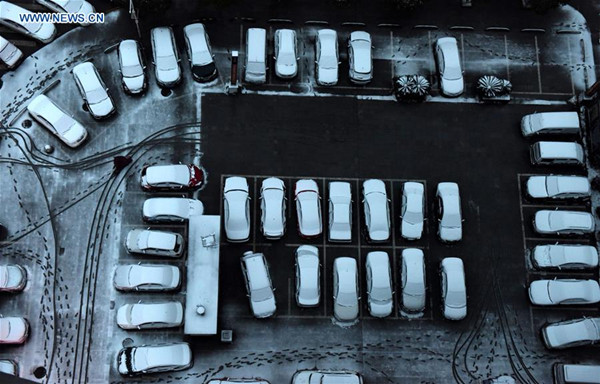
Vehicles are covered with snow in Nanchang, capital of east China's Jiangxi Province, Jan. 22, 2016. A cold front and snowfall hit the province on Friday. (Xinhua/Song Zhenping)
Highways were closed and airport traffic was disrupted as the worst cold front in years hit several Chinese provinces.
Highways in at least 12 provincial regions in northern, eastern and central China have been closed since 8 a.m. on Friday due to blizzards and snowstorms.
A large part of Jiangxi Province, in eastern China, was hit by snowstorms on Friday. The airport in Nanchang, capital of Jiangxi, was closed Friday morning. Several sections of highway in the province were also closed.
Jiangxi's coldest weather since 1992 is expected from Jan. 23 to 26. More than 44 flights have been canceled in east China's Zhejiang Province, the provincial transportation department announced on Friday.
Temperatures in Beijing dropped to minus ten degrees Celsius on Friday and are expected to hit a 30-year low of minus 17 degrees Celsius from Saturday through Sunday, the Beijing meteorological station forecast.
The temperature in Genhe City, located in northern China's Inner Mongolia Autonomous Region, dropped to minus 47.8 degrees Celsius on Thursday, nearing its historical record of minus 49.6 degrees. Genhe has been called the coldest place in China.
Icy fog clouded the street of Genhe, where fish vendors could snap a frozen fish into two pieces.
Ergune in Inner Mongolia and surrounding areas have seen temperatures fall to minus 40 degrees.
Wang Ji, deputy director of the Beijing Weather Center, said that since January, the El Nino effect has subsided, but a bout of cold from the northern Atlantic and the Ural mountains in Russia have headed south, causing snowstorms in Europe and moving eastward to affect China.
"We should not confuse weather changes with broader climate change. Though El Nino has spawned a warm winter since last year, we can still expect cold waves like this one," said Wang.


















































